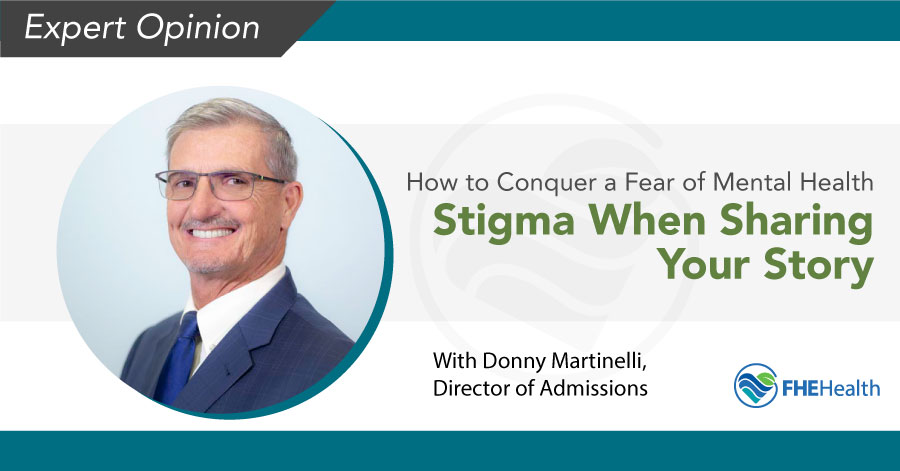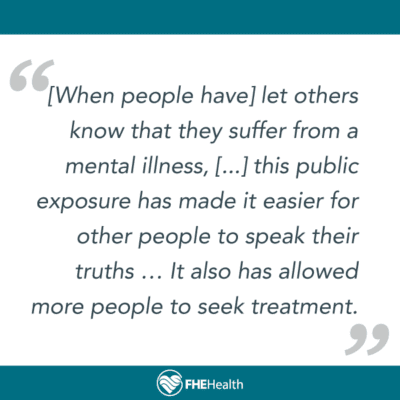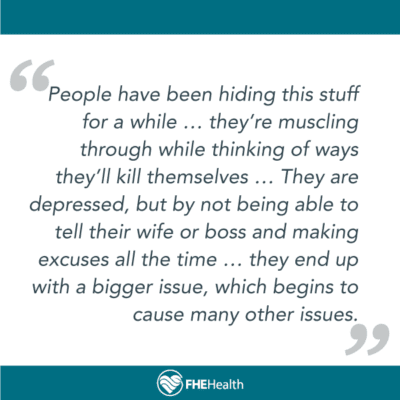
This article has been reviewed for accuracy by our peer review team which includes clinicians and medical professionals. Learn more about our peer review process.
This article featured Donny Martinelli, our former Director of Admissions. Meet Zack Traynor, our new Director of Admissions here!
Today there is greater public awareness and less stigma about mental illness. 73 percent of Americans said they personally know someone who has been diagnosed with a mental health disorder, according to a 2019 CBS News poll. It also found that 50 percent of women and 36 percent of men would feel comfortable talking about their personal experiences with mental health.
While such progress is encouraging, more work remains to be done to reduce the stigma of mental illness. A vast majority of Americans would seem to agree: The same CBS poll found that nine out of 10 Americans believe people with mental illness continue to face discrimination.
Fear of discrimination and stigmatization also help to explain why many people are afraid to go public with their anxiety, depression, or another mental disorder—even when talking about it is critical to finding help and hope for oneself and/or others in similar situations.
How, then, do you conquer a fear of stigmatization to be honest about what you are going through? We put this question before Donald Martinelli. As the director of admissions for FHE Health, he has helped many people asking similar questions. What follow are his insights into how to find the courage to share one’s story and overcome common fears about mental health stigmas.
How Sharing a Mental Health Issue Helps Others and Reduces the Stigma
 If sharing a mental health struggle seems scary, it may be encouraging to remember that it can be both a pathway to personal healing as well as a help to others who may be facing similar issues. When people have “let others know that they suffer from a mental illness,” Martinelli said, “this public exposure “has made it easier for other people to speak their truths … It also has allowed more people to seek treatment.”
If sharing a mental health struggle seems scary, it may be encouraging to remember that it can be both a pathway to personal healing as well as a help to others who may be facing similar issues. When people have “let others know that they suffer from a mental illness,” Martinelli said, “this public exposure “has made it easier for other people to speak their truths … It also has allowed more people to seek treatment.”
As illustration, Martinelli pointed to the positive impact of public figures who have been transparent about their experiences with mental illness. He cited Robert Kennedy, for instance, who has been open about his depression and advocated on behalf of people affected by mental illness.
Martinelli attributed the gradual increase in mental health facilities and treatment options in the U.S. to these sorts of self-revelations by Kennedy and other big names. The many celebrities, politicians, sports stars, and other figures in the public eye who have talked about their personal struggles have helped destigmatize mental illness and the people who live with it. Here is how Martinelli explained it:
When people who are successful or have social status share their struggles, it makes society as a whole more aware, so there’s less of a stigma … It also allows other people to speak out … When you hear someone else say that there are days when they can’t get out of bed and hide in the bathroom because feel they’re about to die (if, say, they have panic disorder) … on a personal level, for someone else suffering from mental illness, it helps to remove the fear and anxiety of telling people what is really going on with them.
What Concerns Keep People from Going Public with Their Stories
 Job security is probably the most common concern that Martinelli encounters among people who are hesitant to talk about their mental health challenges.
Job security is probably the most common concern that Martinelli encounters among people who are hesitant to talk about their mental health challenges.
“People are afraid their employer may think they can’t do their job and that sharing their story could result in job loss or discrimination at work,” Martinelli said. He was quick to point out that unlike generations ago when a mentally ill person might be sent to a psychiatric institution and were “hidden away” and “never came out,” today “there are built-in job protections like the Family Medical Leave Act (FMLA) and Americans with Disabilities Act, so you can seek treatment for a mental health condition without losing your job.”
Another very common concern: How to tell a spouse or loved one when you are not sure how they will react. Martinelli said many people “are afraid of losing the people who love them, out of fear that people won’t want to be around them … They worry that their spouse or loved one may think there’s something wrong with them.”
Here Martinelli gave the example of someone who might be living with major depression and experiencing suicidal thoughts: “Do you want to tell your spouse that you feel like you want to die? How does that go over? From a man’s point of view, how do I tell my wife that I’m at this moment feeling like I want to die?”
Over, time, though, stuffing these thoughts and feelings can cause a strain on relationships, Martinelli said. “People have been hiding this stuff for a while … they’re muscling through while thinking of ways they’ll kill themselves … They are depressed, but by not being able to tell their wife or boss and making excuses all the time … they end up with a bigger issue, which begins to cause many other issues.”
How to Overcome These Fears of Going Public with a Mental Illness
Martinelli was able to offer some advice for how to overcome these common fears of going public with a mental illness. For those who may be worried about seeking treatment out of fear of discrimination from an employer, Martinelli recommended getting educated about federal job protections like the FMLA.
For those whose fears of going public have more to do with how to share their story publicly, Martinelli suggested googling self-help and support groups. They can be outlets for sharing one’s story while remaining anonymous, he said. Over time, with this kind of practice in a confidential forum, Martinelli noted that it can become easier to share one’s story in other settings.
“It’s like anything in life,” Martinelli said. “We have fears of all kinds of things, not just mental health issues … How do you get through a fear? You have to walk through it and find that inner strength. You have to want to get unstuck and walk through that fear.”
The good news is that a fear of talking about what’s going on is often the hardest part of the healing process, according to Martinelli:
Once you get through that fear, it’s easy. Once you finally jump, it’s all better. Nothing happened. Lightning didn’t strike you down. You didn’t end up in the hospital. Your wife didn’t walk out on you. Your kids don’t love you any less. There are all those things we’re so afraid of when in fact all that fear makes whatever the mental health issue was even worse.
As for those who may be afraid to tell someone they love that they are struggling with anxiety, depression, or another mental health condition? Martinelli offered these words of encouragement:
You have to believe it when people tell you they love you. You have to believe that the people who love you really love you unconditionally, and they’ve shown that in life. They don’t know what’s wrong with you, but they know something is wrong. Substance abuse and mental health are the elephant in the room. Your loved one(s) will have to learn about it in order to help you. But the people who love you will always love you.
Martinelli speaks from personal experience: “Every time I’ve had to come out and say, whether with substance abuse or mental health, ‘I need help,’ there were people there to help me.”
Martinelli also knows personally what it is like to face and ultimately overcome fears about going public with a mental health struggle. His discovery: “The more public I became with my recovery I actually found that I garnered respect from most people. It goes from the fear of anybody ever knowing to finding out you’ve got credibility and that people respect you and look at you as someone who has strength.”
Are you struggling with a mental health problem but afraid to tell an employer or someone you love? FHE Health may be able to help. Call us today.






